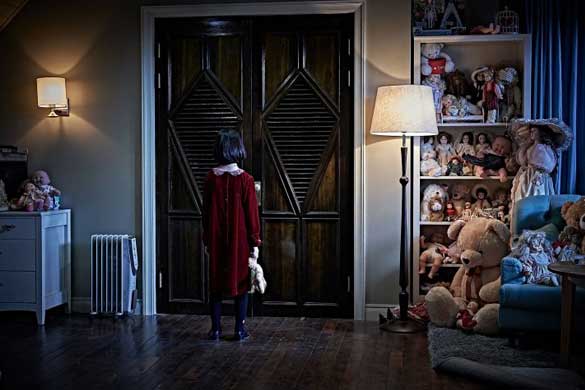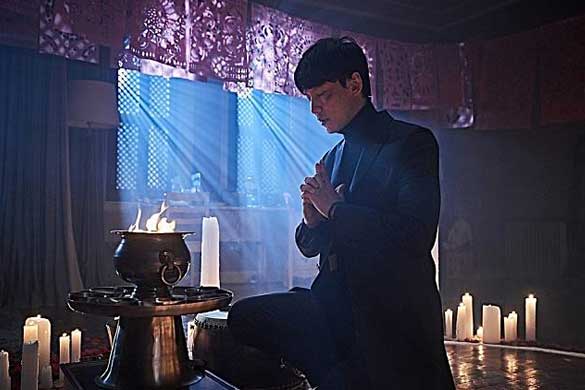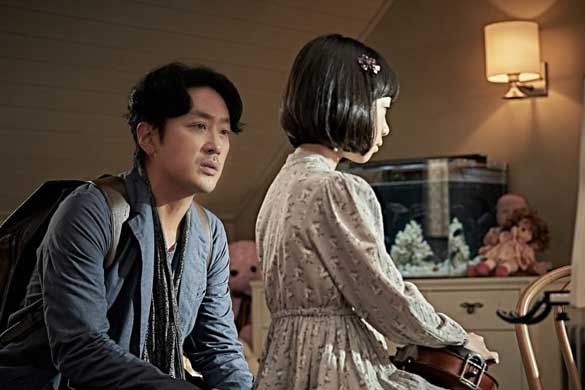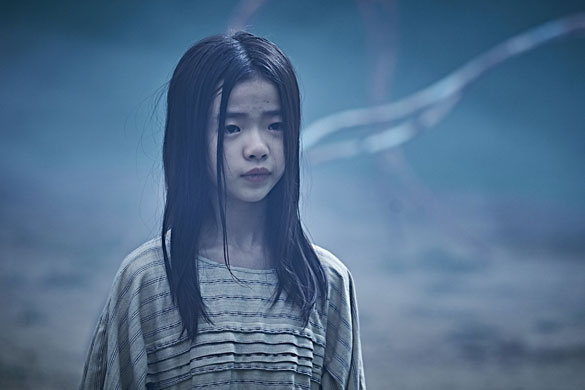"Breathing doesn't prove that we're alive. When we are reborn, we'll be happy, with no debts...
Rather than living like this, we'll be happier dead..."
Synopsis:
Since his wife died in a family car accident, Sang-won (Ha Jung-woo) has struggled balancing his work life as a top rated architect with taking care of his young daughter, I-na (Heo Yool), who is still clearly traumatised by the tragedy. So, in an effort to ease her mental unease and suffering from panic attacks himself, Sang-won decides to move the two of them to a new home off the beaten track.
However, no sooner do they move in than he begins to hear strange sounds and voices coming from I-na's room, her personality alters severely and shortly thereafter she goes missing entirely. He straight away informs the police and appeals to the public through a media broadcast but it quickly becomes clear that virtually everyone assumes he is somehow to blame for her disappearance. That is, apart from Kyung-hoon (Kim Nam-gil) who approaches Sang-won claiming I-na has been taken by a dark, supernatural presence in her bedroom closet and offering to use his exorcism skills to bring her back, for a price.
Incredulous at first but having nowhere else to turn, Sang-won reluctantly agrees, wholly unaware of the sheer level of malevolent demonic violence the two men are about to unleash...
Review:
The Closet opens, so to speak, with a seemingly camcorder recorded religious/spiritual ritual performed by a female shaman, chanting to the point of almost screaming while brandishing a pair of vicious looking knives, gradually moving towards and ultimately in front a large, dark coloured closet the doors of which slowly, ominously begin to creak open...
Probably more than any other recent Korean film, Na Hong-jin's hugely acclaimed The Wailing from 2016 positively screamed (both figuratively and indeed literally) of the sheer power an ever more intense shamanic ritual can bring to a film firmly seated within the horror genre and indeed the idea of attempted healing of tortured/ souls by spiritual means has inherent to it the concept of light vs. dark and good vs. evil which, when handled well, allows such ritualistic intensity to sit within horror like a match made in heaven (if you will), or hell, or indeed somewhere in between, depending on whether light or dark has the upper hand.
The opening ritual in The Closet is later shown to (on the surface) have been a spiritual attempt 20 years ago to ascertain if a missing little girl was alive or dead, in the process standing to underline the fact that I-na's disappearance is far from an isolated incident – similar situations having regularly occurred for decades with undeniable similarities – as well as pointing to the real reason for Kyung-hoon’s involvement and indeed his career choice, the scene's surprisingly violent, bloody ending subsequently reappearing as one of the nightmarish, ghostly visions screaming at Sang-won from the closest before he realises the real state of play. However, it also more importantly fits with the aforementioned theme of the attempted healing of tortured souls in a battle between light and dark even though we won’t realise it until The Closet begins to reveal its raison d'être as a societal critique of the real within the paranormal and a discussion of what really constitutes good and evil (more on this shortly).
 |
The early stages of the main narrative will likely stand as fairly familiar to horror fans (both Korean and other): A seemingly blissful, sunny journey to an idyllic new life in a country mansion for Sang-won and his daughter slowly and increasingly darkened by a series of odd, even creepy, occurrences as difficulties in I-na’s relationship with her father begin to show, and flashbacks to an earlier tragedy start to point to why.
My use of the word “familiar” is not a criticism in this case. The reason being that scenes such as these work like a charm in virtually any horror concept to unsettle within beauty and (seeming) peace prior to darkness taking centre stage, whether, in the case of The Closet, we’re talking about a drive through beautiful countryside surroundings interrupted by ravens eating the entrails of a road-killed deer; birds attracted and crashing to a bloody end on the window of the sumptuous mansion; disembodied voices, stamping footprints, crashes and bangs and even cacophonous, scratchy, out of tune music seemingly coming from an ultimately quiet room with only a quiet, sleeping girl inside; or indeed the early ‘jump scare’ appearances of ghostly figures and screaming, shall we say, entities; etc.
Sure, you’ll likely have seen reminiscent ideas in an absolute plethora of horrors from around the world over the years, but here they still succeed in gradually changing the narrative tone and drawing viewers towards a soon-to-expand storyline and in fact at least some of that success is down to the very familiarity with such, somewhat classic, darkening occurrences.
The tone of the middle stages of The Closet shifts to sit snugly between Sang-won and Kyung-hoon's shaman-based efforts to bring the malevolence within the closet to the fore to a position where it can (hopefully) finally be battled – traditional spiritualism brought right into the 21st century cyber world by Kyung-hoon’s use of EMP meters, computer controlled lights to be triggered by entities and electronic surveillance devices sitting right alongside his more traditional tools such as burning straw dolls and talismans – and Sang-won’s almost procedural investigation into the origin of the closet's paranormal problems, complete with flashbacks pointing (a little at a time) to the true cause of what has become the closet's malevolence, expanded in full as explanation much later. This section ramps up narrative intensity in tandem with pace, especially in a truly creepy scene in which Sang-won hunches, eyes closed, on his daughter’s bedroom floor as a hoard of white eyed demonic lost souls in the shape of children (known as ‘The Blinded’) hiss and growl menacingly while marauding around trying to find him and violently bring him to his end.
 |
However, wholly engaging and at times genuinely creepy though these middle stages are, it is the film’s final foray, as Sang-won enters a visually well realised, genuinely eerie paranormal nether world, where The Closet finally finds the palpable poignancy it has been gradually heading towards since its very beginning.
Throughout the horror genre (not least in Korean cinema), tales featuring demonic/possessed/tormented/tortured/evil children have had an almost prevalence that by its very nature ensures its continued use. Certainly the idea of the loss or stealing of happy innocence which we deem so vital to the wellbeing and future of our vulnerable young is a true life fear that sits as frightening a concept to any parent as any fictional horror trope... or at least that should be the case. That’s where director Kim Kwang-bin takes his cue in revealing The Closet’s aforementioned raison d'être: Juxtaposing Sang-won’s face-off against the closet’s malevolent force and juxtaposed with flashbacks extended from some of those seen earlier in proceedings, the narrative confirms that it has been socially aware all along (which most viewers will hopefully already have figured out), deftly moving fully from the ‘what’ of the closet’s evil to the ‘why' and pointing to the sad fact that in any society (again, not least Korea) true evil can have a wholly human face – real life rather than paranormal – and shockingly be far closer to home than most would like to think from an outside gaze.
These exact issues have of course been discussed regularly and repeatedly in Korean cinema over the decades throughout a number of genres including horror but that fact in no way diminishes The Closet’s poignancy in its social awareness and indeed until such issues no longer exist they need to continue to be shown in their utter, still shocking, unacceptability.
As such, The Closet stands as both a worthy addition to that list as well as to that of recent, well received K-horrors with overt aspects of spiritualism present in the battle of good vs. evil.
Summary:
The Closet is a wholly engaging, often times genuinely creepy, horror deftly using spiritualism in the fight of light against dark that also stands as a serious societal critique, the palpable poignancy of which easily raises its worthiness yet further.
The Closet (클로젯) / 2020
Director: Kim Kwang-bin
Starring: Ha Jung-woo, Kim Nam-gil, Heo Yool, Kim Si-a
|





